Python 玩转百万级游戏数据(附练手源数据)
今天分享的一个实战案例是关于游戏行业的,数据量级比较大,数据包含近229万条记录和109个字段,以下取较重要的字段进行说明。
相关数据已经给大家打包好,感兴趣的同学后台回复“游戏数据”,即可获取完整数据集,做更多有趣探索分析。
字段说明
user_id:用户编码,用户唯一标识
bd_stronghold_level:要塞等级,相当于游戏账号等级
wood_reduce_value:木头消耗数量
stone_reduce_value:石头消耗数量
ivory_reduce_value:象牙消耗数量
meat_reduce_value:肉消耗数量
magic_reduce_value:魔法消耗数量
general_acceleration_reduce_value:通用加速消耗数量
building_acceleration_reduce_value:建筑加速消耗数量
reaserch_acceleration_reduce_value:科研加速消耗数量
training_acceleration_reduce_value:训练加速消耗数量
treatment_acceleration_reduce_value:治疗加速消耗数量
pvp_battle_count:玩家对玩家次数
pve_battle_count:玩家对机器次数
avg_online_minutes:日均在线时间
pay_price : 消费金额
pay_count:消费次数
分析思路
用户注册时间分布情况?
用户的付费情况(付费率,ARPU,ARPPU)?
各等级用户的付费情况?
用户的消费习惯?
可视化数据
分析过程
1. 导入数据
import numpy as npimport pandas as pdfrom pandas import read_csvfrom sklearn.cluster import KMeansimport matplotlib.pyplotas pltimport pylab as plfrom matplotlib.font_managerimport FontManager, FontPropertiespd.set_option('display.max_columns',None)#为了数据安全,copy一份数据df=df0#检查是否有空值print(df.isnull().any().any())#观察数据构成print(df.head())
2. 清洗数据
#以user_id为维度,删除重复数据,并查看用户总数df=df.drop_duplicates(subset='user_id')print('用户总数:',len(df['user_id']))→用户总数:2288007
3. 计算用户注册时间分布
#首先将注册时间精确到天register_date=[]for i in df['register_time']:date=i[5:10]register_date.append(date)df['register_time']=register_date#计算每天的注册人数df_register=df.groupby('register_time').size()df_register.columns=['日期','注册人数']print(df_register)(可视化)plt.plot(df_register)plt.grid(True)pl.xticks(rotation=90)font=FontProperties(fname='/System/Library/Fonts/PingFang.ttc')plt.title('用户注册分布图',fontproperties=font)plt.show()
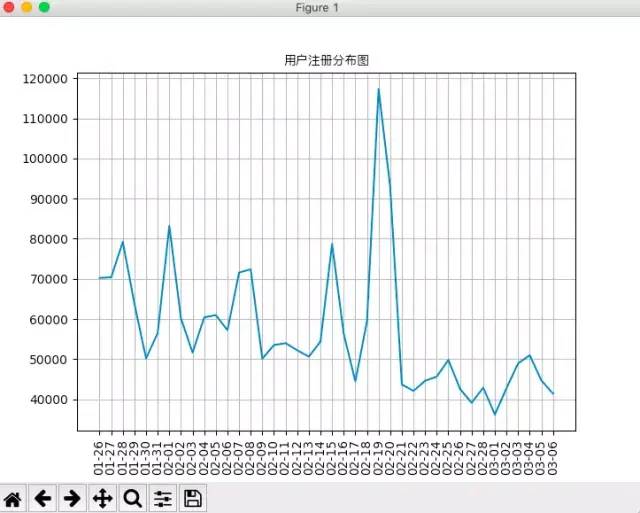
由上图可以看出,用户注册数在2月19日有一次的大的高峰,其他时间也分别有几次小高峰,且高峰的持续时间很短,可以推测是因为游戏推出一些奖励活动或公司对游戏的推广取得了效果进而使注册用户激增。
4. 用户的付费情况(付费率,ARPU,ARPPU)
#付费率(付费人数/活跃人数)df_pay_user=df[(df['pay_price']>0)]pay_rate=df_pay_user['user_id'].count()/df_active_user['user_id'].count()print('付费率:%.2f'%(pay_rate))#ARPU(总付费金额/活跃人数)arpu=df_pay_user['pay_price'].sum()/df_active_user['user_id'].count()print('ARPU:%.2f'%(arpu))#ARPPU(总付费金额/付费人数)arppu=df_pay_user['pay_price'].sum()/df_pay_user['user_id'].count()print('ARPPU:%.2f'%(arppu))

由上图可知目前盈利较好的手游的ARPU超过5元,一般手游在3~5元之间,盈利较差的低于3元,该游戏的ARPU为8.55元,说明盈利水平较高。
5. 不同等级用户的付费情况
df_user=df[['user_id','bd_stronghold_level','pay_price','pay_count']]df_table=pd.pivot_table(df_user,index=['bd_stronghold_level'],values=['user_id','pay_price','pay_count'],aggfunc={'user_id':'count','pay_price':'sum','pay_count':'sum'})df_stronghold_pay=pd.DataFrame(df_table.to_records())#各等级付费人数df_stronghold_pay['pay_num']=df_user[(df_user['pay_price']>0)].groupby('bd_stronghold_level').user_id.count()#各等级付费转化率df_stronghold_pay['pay_rate']=df_stronghold_pay['pay_num']/df_stronghold_pay['user_id']#各等级平均付费金额df_stronghold_pay['avg_pay_price']=df_stronghold_pay['pay_price']/df_stronghold_pay['user_id']#各等级平均付费次数df_stronghold_pay['avg_pay_count']=df_stronghold_pay['pay_count']/df_stronghold_pay['user_id']#重命名列名df_stronghold_pay.columns=['要塞等级','总付费次数','总付费金额','总人数','付费人数','付费转化率','人均付费金额','人均付费次数']df_stronghold_pay=df_stronghold_pay[['要塞等级','总人数','付费人数','付费转化率','总付费金额','人均付费金额','总付费次数','人均付费次数']]df_stronghold_pay=df_stronghold_pay.round(2)print(df_stronghold_pay)
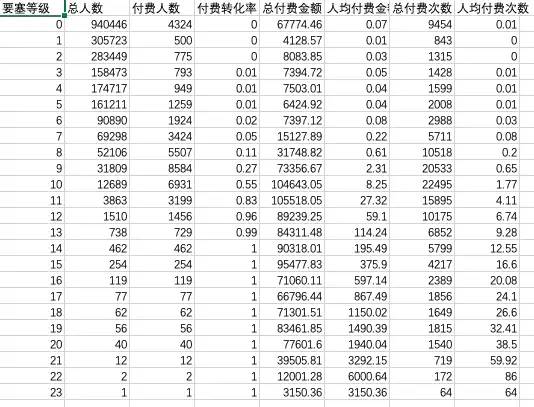
可视化:
#要塞等级—付费转化率x=df_stronghold_pay['要塞等级']y=df_stronghold_pay['付费转化率']plt.xticks(x,range(0,len(x),1))plt.plot(x,y)plt.grid(True)plt.title('不同等级用户付费转化率',fontproperties=font)plt.show()
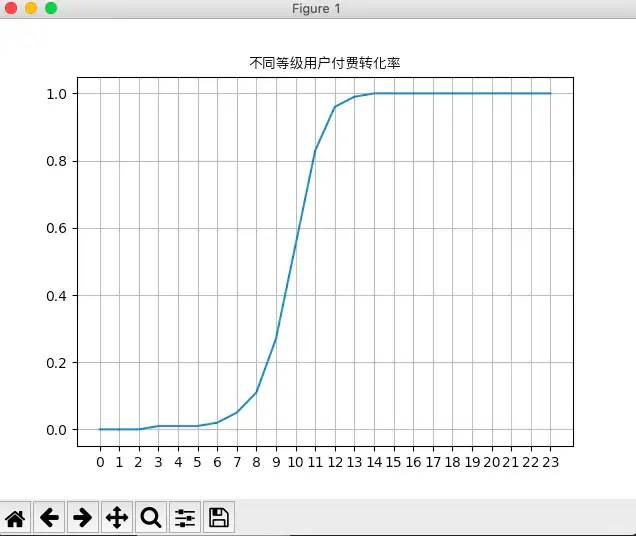
#要塞等级-人均付费金额x=df_stronghold_pay['要塞等级']y=df_stronghold_pay['人均付费金额']plt.xticks(x,range(0,len(x),1))plt.plot(x,y)plt.grid(True)plt.title('不同等级用户人均付费jine',fontproperties=font)plt.show()
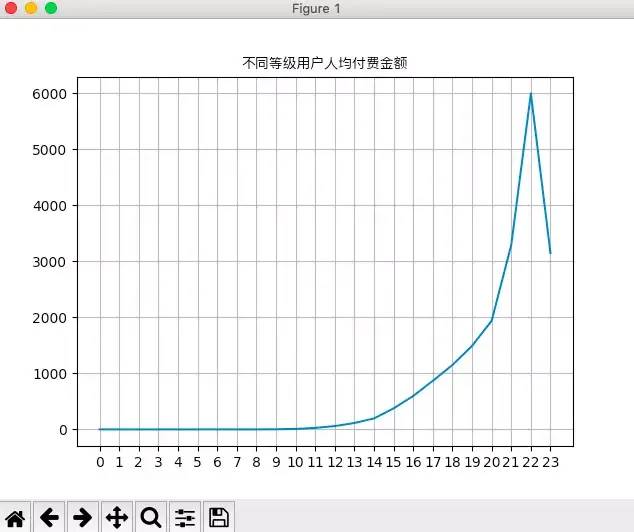
x=df_stronghold_pay['要塞等级']y=df_stronghold_pay['人均付费金额']plt.xticks(x,range(0,len(x),1))plt.plot(x,y)plt.grid(True)plt.title('不同等级用户人均付费jine',fontproperties=font)plt.show()#要塞等级-人均付费次数x=df_stronghold_pay['要塞等级']y=df_stronghold_pay['人均付费次数']plt.xticks(x,range(0,len(x),1))plt.plot(x,y)plt.grid(True)plt.title('不同等级用户人均付费次数',fontproperties=font)plt.show()
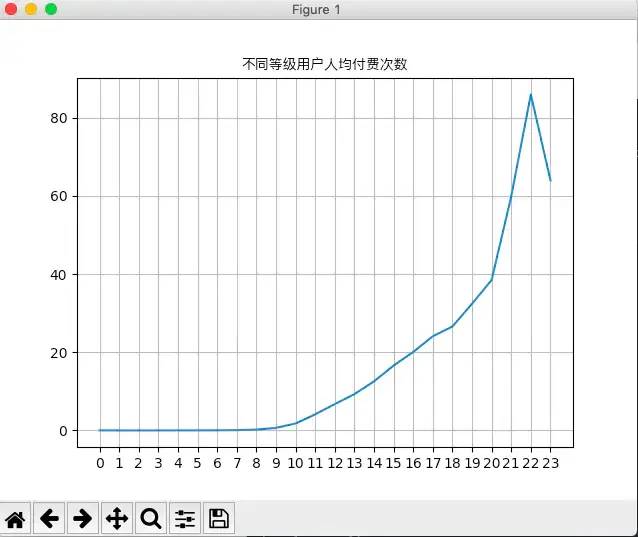
从上面看到用户等级到达10级时,付费率接近60%,等级到达13级时,付费率接近100%,且人均付费金额和次数两项指标也在用户达到10级后增长迅速,因此可以认定10级以上用户为游戏的核心用户。
但是观察用户等级分布,发现绝大部分用户还是处在10级以下的水平,因此如何使用户达到10级是游戏运营接下来需要考虑的事。
6. 不同玩家的消费习惯
该游戏充值主要可以获得道具类(木头、石头、象牙、肉、魔法)和加速券类(通用、建筑、科研、训练、医疗)。根据用户的充值金额大小,分别分析两类消费品的消耗情况。
#将等级>=10级的玩家划分为:消费>=500为高消费玩家,<500为普通玩家df_eli_user=df[(df['pay_price']>=500)&(df['bd_stronghold_level']>=10)]df_nor_user=df[(df['pay_price']<500)&(df['bd_stronghold_level']>10)]#不同玩家的道具消耗情况wood_avg=[df_eli_user['wood_reduce_value'].mean(),df_nor_user['wood_reduce_value'].mean()]stone_avg=[df_eli_user['stone_reduce_value'].mean(),df_nor_user['stone_reduce_value'].mean()]ivory_avg=[df_eli_user['ivory_reduce_value'].mean(),df_nor_user['ivory_reduce_value'].mean()]meat_avg=[df_eli_user['meat_reduce_value'].mean(),df_nor_user['meat_reduce_value'].mean()]magic_avg=[df_eli_user['magic_reduce_value'].mean(),df_nor_user['magic_reduce_value'].mean()]props_data={'high_value_player':[wood_avg[0],stone_avg[0],ivory_avg[0],meat_avg[0],magic_avg[0]],'normal_player':[wood_avg[1],stone_avg[1],ivory_avg[1],meat_avg[1],magic_avg[1]]}df_props=pd.DataFrame(props_data,index=['wood','stone','ivory','meat','magic'])df_props=df_props.round(2)print(df_props)#可视化ax=df_props.plot(kind='bar',title='Props Reduce',grid=True,legend=True)plt.show()
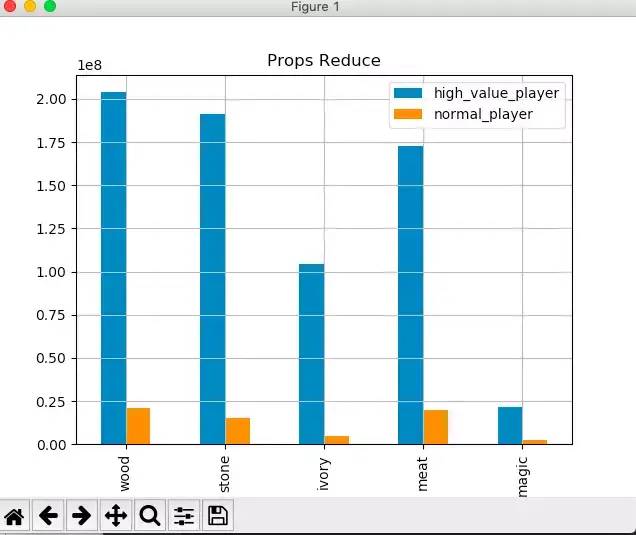
普通玩家和高消费玩家对木头、石头、肉的消耗都较大,魔法的消耗都较小,而在象牙的消耗上,高消费玩家和普通玩家的消耗差距较大。
#不同玩家的加速券消耗情况general_avg=[df_eli_user['general_acceleration_reduce_value'].mean(),df_nor_user['general_acceleration_reduce_value'].mean()]building_avg=[df_eli_user['building_acceleration_reduce_value'].mean(),df_nor_user['building_acceleration_reduce_value'].mean()]research_avg=[df_eli_user['reaserch_acceleration_reduce_value'].mean(),df_nor_user['reaserch_acceleration_reduce_value'].mean()]training_avg=[df_eli_user['training_acceleration_reduce_value'].mean(),df_nor_user['training_acceleration_reduce_value'].mean()]treatment_avg=[df_eli_user['treatment_acceleration_reduce_value'].mean(),df_nor_user['treatment_acceleration_reduce_value'].mean()]acceleration_data={'high_value_player':[general_avg[0],building_avg[0],research_avg[0],training_avg[0],treatment_avg[0]],'normal_player':[general_avg[1],building_avg[1],research_avg[1],training_avg[1],treatment_avg[1]]}df_acceleration=pd.DataFrame(acceleration_data,index=['general','building','researching','training','treatment'])print(df_acceleration.round(2))#可视化ax=df_acceleration.plot(kind='bar',title='Acceleration Reduce',grid=True,legend=True)plt.show()
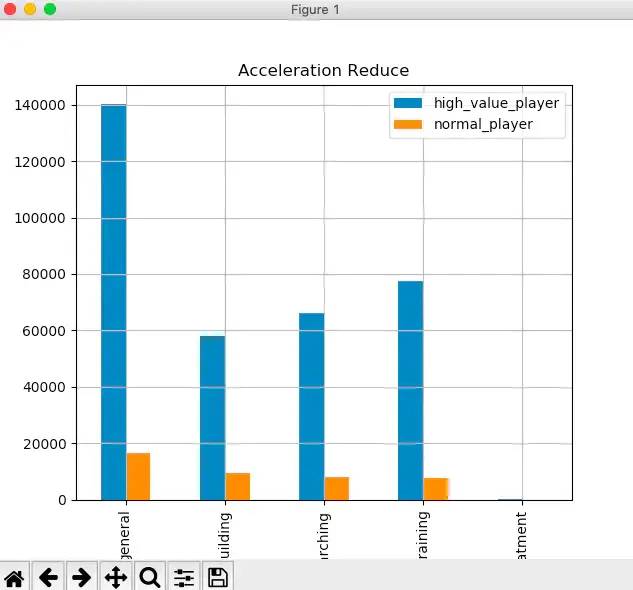
从上图看出两类玩家对对治疗加速券消耗都很小,对通用加速券的消耗差异较大,其他三种加速券消耗差别不大。
结论
1. 该游戏具有较大的用户基数,且新用户注册受游戏活动、新版本等因素影响较大。
2. 该游戏的ARPU为8.55,说明该游戏的盈利能力较高。
3. 用户等级达到10级后,付费意愿明显上升,且达到13级时付费率将近100%。但是绝大多数用户仍然停留在10级以下,如何使用户平滑升至10级尤为重要。
4. 消费习惯上,高消费玩家对象牙和通用加速券的需求远多于一般玩家。
End.
作者:星屑m
来源:简书
帮朋友友情招聘:
华为德科OD招聘,可选岗位较多:
1. C/C++
2. linux驱动
3. Arm
4. Python
工作主要内容是两大类:
1) 软件开发类:包括驱动、中间件、加速库、工具链、管理软件等,这部分工作偏底层
2) 水平解决方案开发类:主要包括大数据、数据库、分布式存储、native(云游戏、云手机)、Web、HPC、图像处理、视频编解码、AL等。开发语言主要是C、C++、python
德科华为合作研发人员招聘:
1、定岗定级和华为保持一致;
2、薪酬框架和同级别的华为人员一致;
3、培训培养和工作安排和绩效考核由华为负责,工作挑战和机会和华为一致;
4、绩效优秀员工转华为。
地点:西安
如有意向,可发简历至邮箱:wangzhen205@huawei.com
